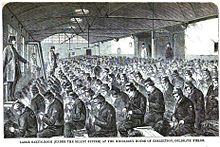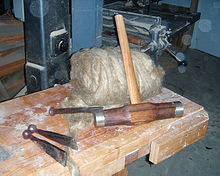- Oakum
-
 Prisoners picking oakum at Coldbath Fields Prison in London.
Prisoners picking oakum at Coldbath Fields Prison in London.
Oakum is a preparation of tarred fiber used in shipbuilding, for caulking or packing the joints of timbers in wooden vessels and the deck planking of iron and steel ships, as well as cast iron plumbing applications. Oakum was at one time recycled from old tarry ropes and cordage, which were painstakingly unraveled and taken apart into fiber; this task of picking and preparation was a common penal occupation in prisons and workhouses.
In modern times, the fibrous material used in oakum is derived from virgin hemp or jute. The fibers are impregnated with tar or a tar-like substance, traditionally pine tar (also called 'Stockholm tar'), an amber-colored pitch made from pine sap. Petroleum byproducts can be utilized for a tar-like substance that can also be used for modern oakum. White oakum is made from untarred material.
History
The word oakum is derived from Middle English okome, from Old English ācumba, from ā- (separative and perfective prefix) + -cumba (akin to Old English camb comb)—literally "off-combings".
Picking oakum was a common occupation in Victorian times in British prisons and workhouses. In 1862, girls under 16 at Tothill Fields Bridewell had to pick 1 pound a day, and boys under 16 had to pick 1.5 pounds.[1] Over the age of 16, girls and boys had to pick 1.5 pounds and 2 pounds per day respectively.[1] The oakum was sold for £4 10s (£331 in modern money) per hundredweight (50.8 kg).[1] At Coldbath Fields Prison, the men's counterpart to Tothill Fields, prisoners had to pick 2 pounds per day unless sentenced to hard labour, in which case they had to pick between 3 and 6 pounds of oakum per day.[2]
In Herman Melville's novella Benito Cereno, crew members of a slave ship spend their idle hours picking oakum.
Charles Dickens's novel Oliver Twist mentions the extraction of oakum by orphaned children in the workhouse. The oakum extracted was to be used by navy ships, and the instructor said that they were serving the country.
The Innocents Abroad, a novel by Mark Twain, also mentions in chapter 37 a "Baker's Boy/Famine Breeder" who eats soap and oakum, but prefers oakum. which makes his breath foul and teeth stuck up with tar.
While discussing the appropriate attire for American Supreme Court justices, Thomas Jefferson was once famously quoted as saying, in reference to traditional court dress: "For heaven's sake, discard the monstrous wig which makes the English judges look like rats peeping through bunches of oakum."[3]
Plumbing
Oakum is used to seal cast iron drain piping. After setting the pipes together, oakum is packed into the joints, then molten lead is poured into the joint, creating a permanent seal. The oakum swells and seals the joint, the "tar" in the oakum prevents rot and the lead keeps the joint physically tight. Currently other methods, such as rubber seals, are more commonly used.[4]
References
- ^ a b c Mayhew, Henry; Binny, John (1862). The Criminal Prisons of London, and Scenes of Prison Life. Volume 3 of The Great Metropolis. London: Griffin, Bohn, and Company. p. 477. http://books.google.co.uk/books?id=TGAJAAAAQAAJ&pg=PA477.
- ^ Mayhew & Binny (1862) p. 312.
- ^ Harrison, Benjamin (1897). The Constitution and Administration of the United States of America. London: David Nutt. p. 320. http://books.google.com/books?id=fX8_AAAAIAAJ&pg=PA320&q=oakum#v=onepage&q=oakum&f=false.
- ^ Yates, David (1 February 2005). "The Lost Art of Making Lead Joints". Contractormag.com. http://contractormag.com/columns/yates/cm_column_379/. Retrieved 6 July 2011.
 This article incorporates text from a publication now in the public domain: Chisholm, Hugh, ed (1911). Encyclopædia Britannica (11th ed.). Cambridge University Press.
This article incorporates text from a publication now in the public domain: Chisholm, Hugh, ed (1911). Encyclopædia Britannica (11th ed.). Cambridge University Press.
Categories:
Wikimedia Foundation. 2010.


